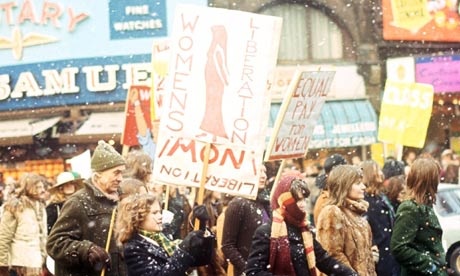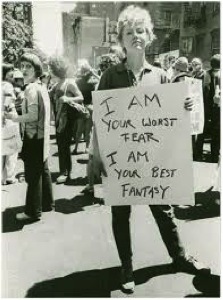Women Strike! A reading list for International Women's Day

"What is 'Women's Day'? Is it really necessary?" Alexandra Kollontai asked readers of the Russian journal Pravda a centenary ago. "On Women's Day," she wrote, "the organised demonstrate against their lack of rights."
Women in more than 50 countries will go on strike from paid and unpaid labour today while millions more will be taking part in direct action on what is set to be one of the most political International Women’s Days in history.
Prior to its revival by feminist movements in the 70's and its adoption by the UN in 1977, 'Woman's Day' was first recognized in the United States in 1910 following the thirteen week long strike of 20,000 female garment workers. International Women's Day was then recognized by the second Conference of Socialist Women as a means to express internationalism in their struggle. Four years later on this day in Russia, bread riots led by women fed directly into the first moments of the 1917 revolution.
Taking International Women's Day back to its radical roots, we bring you a Verso reading list of crucial books and authors covering topics ranging from direct action, sex work, ageing, the nuclear family, neoliberal feminism, class, and psychoanalysis.

The Dialectic of Sex by Shulamith Firestone is a “A landmark manifesto” [Susan Faludi]; originally published in 1970, when Shulamith Firestone was just twenty-five years old, this is the first book of the women’s liberation movement to put forth a feminist theory of politics.
*not available in North America from Verso.
Direct Action: Protest and the Reinvention of American Radicalism - as Americans take to the streets in record numbers to resist the presidency of Donald Trump, L.A. Kauffman’s timely, trenchant history of protest offers unique insights into how past movements have won victories in times of crisis and backlash and how they can be most effective today.
*currently only available in North America
Separate and Dominate: Feminism and Racism after the War on Terror is an examination of how mainstream feminism has been mobilized in support of racist measures. Christine Delphy co-founded the journal Nouvelles questions féministes with Simone de Beauvoir in the 1970s and became one of the most influential figures in French feminism. Today, Delphy remains a prominent and controversial feminist thinker, a rare public voice denouncing the racist motivations of the government’s 2011 ban of the Muslim veil.

Originally published in 1978, Black Macho and the Myth of the Superwoman caused a storm of controversy. Michele Wallace blasted the masculine biases of the black politics that emerged from the sixties. She described how women remained marginalized by the patriarchal culture of Black Power, demonstrating the ways in which a genuine female subjectivity was blocked by the traditional myths of black womanhood.
If They Come in the Morning … : Voices of Resistance edited by Angela Y. Davis. With race and the police once more burning issues, this classic work from one of America’s giants of black radicalism has lost none of its prescience or power.
First published in 1990, Michele Wallace’s Invisibility Blues is widely regarded as a landmark in the history of black feminism. Wallace’s considerations of the black experience in America include recollections of her early life in Harlem; a look at the continued underrepresentation of black voices in politics, media, and culture; and the legacy of such figures as Zora Neale Hurston, Toni Cade Bambara, Toni Morrison,and Alice Walker. Wallace addresses the tensions between race, gender, and society, bringing them into the open with a singular mix of literary virtuosity and scholarly rigor.
Beyond the Pale: White Women, Racism, and History by Vron Ware is a pioneering study of how ideas about white women have shaped the history of racism.
Playing the Whore: The Work of Sex Work by Melissa Gira Grant - an important contribution to debates around sex and work, in which sex workers' demands, too long relegated to the margins, take center stage: sex work is work, and sex workers' rights are human rights.
Trans: A Memoir by Juliet Jacques. Afterword by Sheila Heti.
“An honest, articulate account of one life so far.” – Guardian
In July 2012, aged thirty, Juliet Jacques underwent sex reassignment surgery—a process she chronicled with unflinching honesty in a serialised national newspaper column. Trans tells of her life to the present moment: a story of growing up, of defining yourself, and of the rapidly changing world of gender politics.
For twenty-five years, Feminism and Nationalism in the Third World has been an essential primer on the late nineteenth- and early twentieth-century history of women’s movements in Asia and the Middle East. In this engaging and well-researched survey, Kumari Jayawardena presents feminism as it originated in the Third World, erupting from the specific struggles of women fighting against colonial power, for education or the vote, for safety, and against poverty and inequality.

I, Rigoberta Menchú: An Indian Woman in Guatemala by Rigoberta Menchú is the best-selling account of the life of Latin American peasant woman and winner of the Nobel Peace Prize.
Who Is Rigoberta Menchú? by Greg Grandin, a leading historian who takes on the lies told about Rigoberta Menchú's bestselling memoir.
Woman’s Consciousness, Man’s World by Sheila Rowbotham is a groundbreaking examination of the birth, development and impact of Feminist consciousness.
The Anti-Social Family by Michèle Barrett and Mary McIntosh - a sensitive but uncompromising socialist-feminist critique of the nuclear family.
Straight Sex: Rethinking the Politics of Pleasure by Lynne Segal is a manifesto of sexual liberation, from the leading feminist thinker.
Woman's Estate by Juliet Mitchell combines the energy of the early seventies feminist movement with the perceptive analyses of the trained theorist, making it one of the most influential socialist feminist statements of its time.
The Power to Choose: Bangladeshi Women and Labour Market Decisions in London and Dhaka by Naila Kabeer is a powerful analysis of how globalization is affecting the lives of women at work.
Machos, Mistresses, Madonnas: Contesting the Power of Latin American Gender Imagery edited by Marit Melhuus and Kristi Anne Stølen paints a true picture of gender relations in Latin America.

Out of Time: The Pleasures and the Perils of Ageing by Lynne Segal “Lynne Segal cuts through the current discourse on ageing with a sharp scalpel, an open mind and boundless compassion. If you have detected even one grey hair, read this book while you still have time” – Barbara Ehrenreich
Women’s Oppression Today: The Marxist/Feminist Encounter by Michèle Barrett - a classic text in the debate about Marxism and feminism, exploring how gender, sexuality and the “family-household system” operate in relation to contemporary capitalism.
Fortunes of Feminism: From State-Managed Capitalism to Neoliberal Crisis by Nancy Fraser traces the feminist movement’s evolution since the 1970s and anticipates a new—radical and egalitarian—phase of feminist thought and action.
Masks of Anarchy: The Story of a Radical Poet, from Percy Shelley to the Triangle Factory Fire by Michael Demson, illustrated by Summer McClinton is a graphic history of a poem that became aninspiration to immigrant, largley female, workers in New York.
Red Rosa: A Graphic Biography of Rosa Luxemburg by Kate Evans - in this beautifully drawn work of graphic biography, writer and artist Kate Evans has opened up her subject’s intellectual world to a new audience, grounding Luxemburg’s ideas in the realities of an inspirational and deeply affecting life.

Dreamers of a New Day: Women Who Invented the Twentieth Century by Sheila Rowbotham. From the 1880s to the 1920s, a profound social awakening among women extended the possibilities of change far beyond the struggle for the vote. This book is an acclaimed exploration of these women who revolutionized American and British life.
Women's Work, Men's Property: The Origins of Gender and Class edited by Stephanie Coontz and Peta Henderson is an important book from Verso's history that explores the sociohistorical roots of gender inequality.
A Vindication of the Rights of Woman by Mary Wollstonecraft remains one of history's most important and elegant broadsides against sexual oppression.
Sexuality in the Field of Vision by Jacqueline Rose is a brilliantly original exploration of the interface between feminism, psychoanalysis, semiotics and film theory.

The Letters of Rosa Luxemburg by Rosa Luxemburg are letters from the heroic German revolutionary to her comrades, friends and lovers. Her political concerns are revealed alongside her personal struggles within a socialist movement that was often hostile to independently minded women.
Precarious Life: The Powers of Mourning and Violence by Judith Butler responds to the US's perpetual war and explores how mourning could inspire solidarity.

Female Sexualization: A Collective Work of Memory by Frigga Haug is an enlightening perspective on femininity and sexualization.
In Family Secrets: Acts of Memory and Imagination Annette Kuhn turns her attention to the deconstruction of pictures closer to home—photographs from her own childhood and images from her shared ethnographic past—to trace a trajectory from personal to collective acts of memory.
Women's Pictures: Feminism and Cinema by Annette Kuhn - This pioneering and influential work of feminist theory has been extensively updated by the author to chart the changes in feminist film theory and practice between the eighties and the nineties.

Lust For Life: On the Writings of Kathy Acker edited by Carla Harryman, Avital Ronell, and Amy Scholder in which scholars and artists reflect on the transgressive twentieth-century literary icon.
Reversed Realities: Gender Hierarchies in Development Thought by Naila Kabeer asks why development organizations are failing women in poverty.

Scum Manifesto was considered one of the most outrageous, violent and certifiably crazy tracts when it first appeared in 1968. The focus of this edition is not on the nostalgic appeal of the work, but on Avital Ronell's incisive introduction, "Deviant Payback: The Aims of Valerie Solanas." Here is a reconsideration of Solanas's infamous text in light of her social milieu.
Raising Expectations (and Raising Hell): My Decade Fighting for the Labor Movement, by Jane McAlevey, argues that labor can be revived, but only if the movement acknowledges its mistakes and fully commits to deep organizing, participatory education, militancy, and an approach to workers and their communities that more resembles the campaigns of the 1930s—in short, social movement unionism that involves raising workers’ expectations (while raising hell).